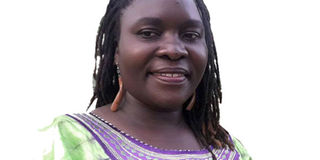Walk the talk on involving women in decision making

Emilly Comfort Maractho
What you need to know:
- First address exclusion. If we continue the legal way, reserving seats for women here and there, without addressing the real issues of exclusion and barriers to women’s participation in decision making beyond politics, we are paying lip-service to women.
- Trade can do us all a favour and send a woman to the UIA board. More women today are qualified to participate.
This is March, the month that everyone wants to say something nice about women’s progress in society, the media profiling ‘successful women’ (usually the same ones every year) and some women get medals, purported to have made this or that contribution.
Yet, I meet people all the time, in the course of my research, we seem not to see tangible contributions made by women except to be seen as holding power, especially those in politics. This is disappointing because their measure of contribution is often flawed or biased.
I find it hard to believe that some people question Speaker Rebecca Kadaga’s contribution to women, for instance. Yet, some of the doubt emanates from the contradictions inherent in policy and practice.
The New Vision had a story on Speaker Kadaga’s endorsement for a review of the procurement laws to ensure that 30 per cent of all government contracts are reserved for women (New Vision of Monday, March 18).
According to Speaker Kadaga, there is need for deliberate action to reduce the disproportionate engagement of women in productive activities by opening new opportunities for them.
She suggested that organisations such as Uganda National Roads Authority (Unra) lock 30 per cent of contracts for women.
Of course, there is no doubt that laws have their marked place as game changers. The constitutional 30 per cent of seats in Parliament is a good example.
The same day, the Daily Monitor carried a comprehensive story on the Uganda Investment Authority (UIA) new board, to be chaired by Mr Emely Kukgonza. According to State Minister for Investment Evelyn Anite, the new board is expected to streamline and restructure UIA. It is hoped that the new board will put to bed some of the problems the institution was faced with, that minimised its progress. The old board, is thus sent home, with the aim of bringing in fresh ideas.
These two articles present excellent areas for reflection on women’s engagement in decision making and economic development. There are real problems with this legal approach Kadaga proposes if not backed by consciousness where laws do not apply yet, and perception has not significantly changed about women in positions of power.
On the one hand, you have Speaker Kadaga suggesting that 30 per cent of government contracts be reserved for women to unlock their potential. We all know the nature of these contracts. The question is, for which women would we be locking 30 per cent of government contracts? One of the fierce arguments against the current model of affirmative action is that it has locked power for some specific group of women, and that needs to be addressed.
On the other hand, minister Anite is presenting a new board of UIA that only includes one woman out of the six already nominated (83 per cent male). And if Trade nominates another man, that will be 86 per cent male.
What justification can those nominating possibly have for including only one woman in an investment authority in this day and era where Uganda is perpetually lauded as leading the way for women’s empowerment? Is it possible the appointing authority do not see qualified women in this country who can serve on such boards? I can think of a dozen over the top of my head.
Part of the problem in this country’s policy response to many development challenges has been the piece-meal approach to things, often ignoring linkages and synergies within government, sometimes even within the same sector. How can we expect that government contracts will favour women if we reserve 30 per cent of contracts for them and actually unlock opportunities for women, when many boards of government entities have just one woman? There may be some without a woman, of course.
We have to walk the talk to involve women in decision making and the whole idea of equal opportunities.
If we continue the legal way, reserving seats for women here and there, without addressing the real issues of exclusion and barriers to women’s participation in decision making beyond politics, we are paying lip-service to women. Trade can do us all a favour and send a woman to the UIA board. More women today are qualified to participate.
Dr Maractho is the head of Journalism and Media Studies Department, Uganda Christian University.
[email protected]




